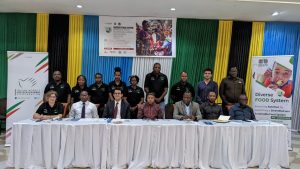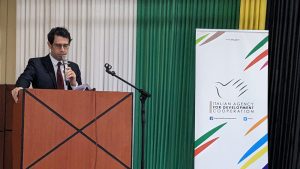Dodoma, 03/03/2023. On Friday, 3rd of March, we were at the launch event of the project "Diverse Food System: Improvement of nutrition with support for a diversified and sustainable food system", funded by the Italian Agency for Development Cooperation (Aics) and implemented by LVIA – Associazione Volontari Internazionali Laici. The project partners are CUAMM – CUAMM – Collegio Universitario Aspiranti Medici Missionari, the local association Mtandao wa Vikundi vya Wakulima Tanzania – MVIWATA and the College of Agriculture of the Sokoine University of Agriculture.
The initiative, which has an expected duration of 3 years, aims to improve the effectiveness and inclusiveness of the food and nutrition security system of the communities residing in the Dodoma region, with a particular focus on the most vulnerable categories of the population such as minors pregnant women etc. Indeed, in the Dodoma Region there are numerous cases of chronic (37.2%) and acute (0.4%) malnutrition and inequality in terms of food security particularly affects women and children.
The event was attended by Paolo Razzini, head of the coordination office of Aics Nairobi in Tanzania, together with government representatives of the districts of Kongwa, Chawmino and Bahi and representatives of partner organizations.
During his speech, Razzini underlined how improving nutrition and increasing food security is a priority sector of Aics. This priority aligns with several strategic development plans and guidelines of the United Republic of Tanzania, such as the National Multisectoral Nutrition Action Plan 2021/22-2025/26, the Tanzania Horticultural Development Strategy (2012-2021), the National Agricultural Plan (2022-2030) and the National Guidelines of Integrated Management of Acute Malnutrition.
The direct beneficiaries of the initiative will be about 114,000 people, mainly in rural areas (about 85%), divided as follows: about 21,800 children under 5 will be screened for malnutrition, about 22,400 women and mothers of children under 5 years will be made aware of good hygienic-nutritional practices and gender equality, about 42,000 farmers (of which over 25,200 young people) will be trained and helped to achieve greater production diversification, 3,000 farmers will be supported with capacity building and access to markets for native vegetables and finally, through awareness-raising activities, 20,000 consumers in urban areas will be able to make more informed nutritional choices.


